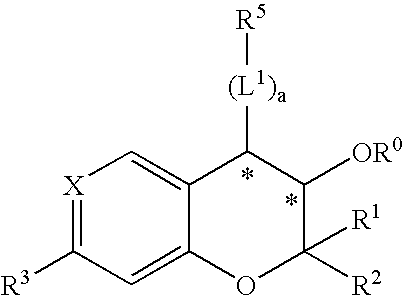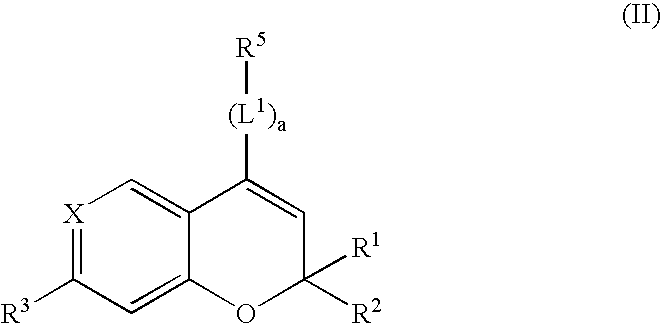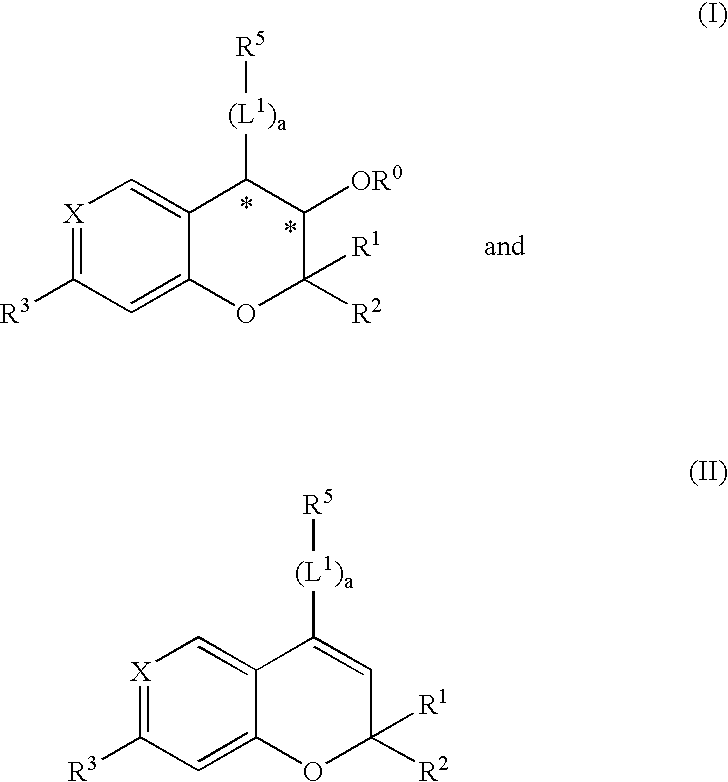Benzopyran derivatives as potassium channel openers
a technology of potassium channel and derivatives, applied in the field ofbenzopyran derivatives, can solve the problems of involuntary bladder contracting, change in membrane potential difference, and inability to detect the bladder in tim
- Summary
- Abstract
- Description
- Claims
- Application Information
AI Technical Summary
Problems solved by technology
Method used
Image
Examples
example 1
(3S,4R)-3-Hydroxy-4-(2H-imidazol-2-ylsulfanyl)-2,2-dimethyl-chroman-6-carbonitrile (Compound #25)
[0211]
[0212](S,S)-2,2-Dimethyl-1a,7b-dihydro-2H-1,3-dioxa-cyclopropa[a]naphthalene-6-carbonitrile (1 mmoL), 1,3-dihydro-imidazole-2-thione (1 mmoL) and anhydrous K2CO3 (1.5 mmoL) in DMF (5 mL) were heated at 100° C. for 4˜6 hrs. The solid was filtered off and the reaction mixture was partitioned between ethyl acetate and water. The organic layer was washed with saturated NH4Cl, brine, then dried over anhydrous Na2SO4, filtered and concentrated to yield a yellow oil. Silica gel chromatography separation yielded the title compound as a white solid.
[0213]1H NMR: (CDCl3) δ 9.90 (br, 1H), 8.00 (s, 1H), 7.18 (d, J=5.1 Hz, 1H), 7.10 (s, 2H), 6.85 (d, J=5.4 Hz, 1H), 4.35 (d, J=5.4 Hz, 1H), 4.10 (d, J=5.4 Hz, 1H), 1.58 (s, 3H), 1.20 (s, 3H)
[0214]MS (m / z): MH+ 302.
example 2
4-(4,5-Dihydro-oxazol-2-ylsulfanyl)-3-hydroxy-2,2-dimethyl-chroman-6-carbonitrile (Compound #68)
[0215]
[0216]Following the procedure described in the Example 1, using (±) 2,2-dimethyl-1a,7b-dihydro-2H-1,3-dioxa-cyclopropa[a]naphthalene-6-carbonitrile and 3H-oxazole-2-thione as starting materials, the title compound was prepared as a white solid.
[0217]1H NMR: (CDCl3) δ 7.50 (m, 1H), 7.5 (s, 1H), 6.95 (m, 1H), 5.95 (m, 1H), 4.20 (m, 1H), 3.85-3.50 (m, 4H), 2.70 (m, 1H), 1.55 (s, 3H), 1.35 (s, 3H)
[0218]MS (m / z): MH+ 396.
example 3
(3S,4R)-3-Hydroxy-4-(1H-imidazole-2-sulfonyl)-2,2-dimethyl-chroman-6-carbonitrile (Compound #71)
[0219]
[0220](3S,4R)-3-Hydroxy-4-(2H-imidazol-2-ylsulfanyl)-2,2-dimethyl-chroman-6-carbonitrile (0.8 mmoL) was treated with OXONE (2 mmoL) in MeOH (2 mL) and water (2 mL) at room temperature. After 4 hrs, the solid was filtered off and the solvent was removed. The residue was partitioned between ethyl acetate and water. The aqueous layer was extracted with ethyl acetate three times. The combined organic layer was washed with brine, filtered, dried over anhydrous Na2SO4 and concentrated to yield crude material, which was purified by silica gel chromatography to yield the title compound as a white solid.
[0221]1H NMR (MeOD) δ 8.00 (s, 1H), 7.55 (m, 1H), 7.30 (m, 2H), 6.85 (m, 1H), 4.65 (m, 1H), 4.45 (m, 1H), 1.50 (s, 3H), 1.00 (s, 3H)
[0222]MS (m / z): MH+ 334
PUM
| Property | Measurement | Unit |
|---|---|---|
| temperature | aaaaa | aaaaa |
| temperature | aaaaa | aaaaa |
| temperature | aaaaa | aaaaa |
Abstract
Description
Claims
Application Information
 Login to View More
Login to View More - R&D
- Intellectual Property
- Life Sciences
- Materials
- Tech Scout
- Unparalleled Data Quality
- Higher Quality Content
- 60% Fewer Hallucinations
Browse by: Latest US Patents, China's latest patents, Technical Efficacy Thesaurus, Application Domain, Technology Topic, Popular Technical Reports.
© 2025 PatSnap. All rights reserved.Legal|Privacy policy|Modern Slavery Act Transparency Statement|Sitemap|About US| Contact US: help@patsnap.com



